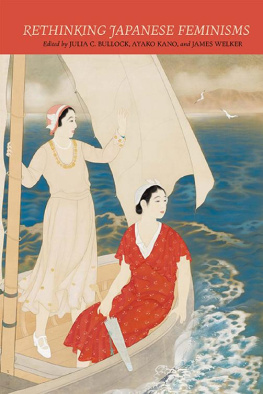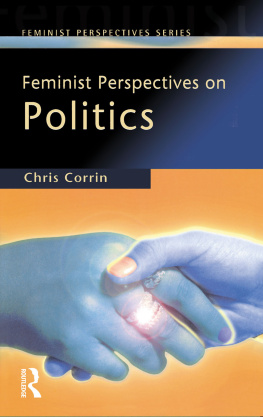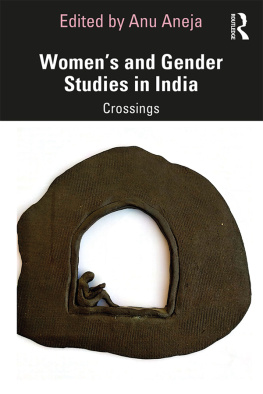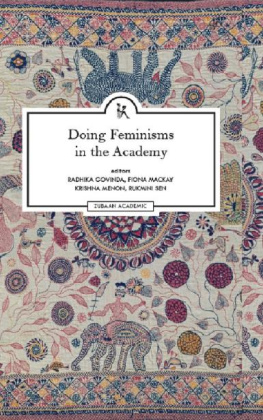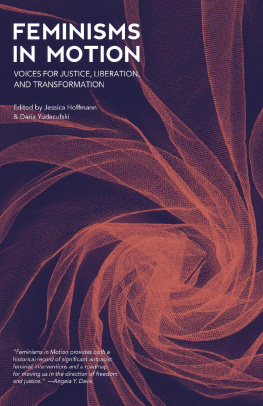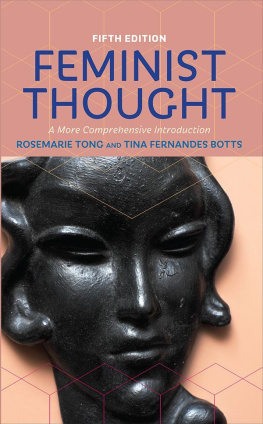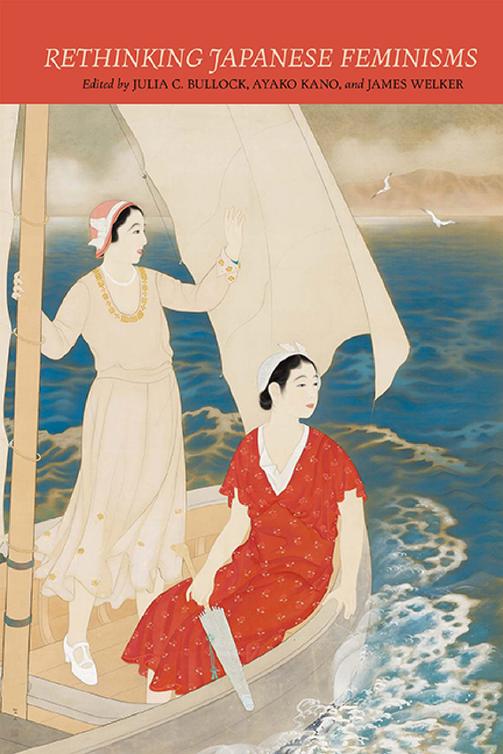
i
Rethinking Japanese
Feminisms ii
iv
Copyright
2018 University of Hawaii Press
All rights reserved
Printed in the United States of America
22 21 20 19 18 17 6 5 4 3 2 1
Library of Congress Cataloging-in-Publication Data
Names: Bullock, Julia C., editor. | Kano, Ayako, editor. | Welker, James, editor.
Title: Rethinking Japanese feminisms / edited by Julia C. Bullock, Ayako Kano, and James Welker.
Description: Honolulu: University of Hawaii Press, [2017] | Includes bibliographical references and index.
Identifiers: LCCN 2017014299 | ISBN 9780824866693 (cloth; alk. paper) Amazon Kindle 9780824866723 EPUB 9780824866716 PDF 9780824866730
Subjects: LCSH: FeminismJapan.
Classification: LCC HQ1762 .R48 2017 | DDC 305.420952dc23
LC record available at https://lccn.loc.gov/2017014299
University of Hawaii Press books are printed on acid-free paper and meet the guidelines for permanence and durability of the Council on Library Resources.
Designed by Publishers Design and Production Services, Inc.
Cover art:
Miki Suizan, Japanese, 18871957
Fair Wind (Junp)
Japanese, Shwa era, 1933
Panel; ink, color, and mica on silk
241.6 x 191.5 cm (95 1/8 x 75 3/8 in.) Museum of Fine Arts, Boston
Charles H. Bayley Picture and Painting Fund and Museum purchase with funds donated anonymously
2007.813
v
Contents
- Introduction
Julia C. Bullock, Ayako Kano, and James Welker
- Womens Rights as Proletarian Rights: Yamakawa Kikue, Suffrage, and the Dawn of Liberation
Elyssa Faison - From Motherhood in the Interest of the State to Motherhood in the Interest of Mothers: Rethinking the First Mothers Congress
Hillary Maxson - From Womens Liberation to Lesbian Feminism in Japan: Rezubian Feminizumu within and beyond the man Ribu Movement in the 1970s and 1980s
James Welker - The Mainstreaming of Feminism and the Politics of Backlash in Twenty-First-Century Japan
Tomomi Yamaguchi
- Coeducation in the Age of Good Wife, Wise Mother: Koizumi Ikukos Quest for Equality of Opportunity
Julia C. Bullock - Flower Empowerment: Rethinking Japans Traditional Arts as Womens Labor
Nancy Stalker vi - Liberating Work in the Tourist Industry
Chris McMorran
- Seeing Double: The Feminism of Ambiguity in the Art of Takabatake Kash
Leslie Winston - Feminist Acts of Reading: Ariyoshi Sawako, Sono Ayako, and the Lived Experience of Women in Japan
Barbara Hartley - Dangerous Women and Dangerous Stories: Gendered Narration in Kirino Natsuos Grotesque and Real World
Kathryn Hemmann
- Yamakawa Kikue and Edward Carpenter: Translation, Affiliation, and Queer Internationalism
Sarah Frederick - Rethinking Japanese Feminism and the Lessons of man Ribu: Toward a Praxis of Critical Transnational Feminism
Setsu Shigematsu - Toward Postcolonial Feminist Subjectivity: Korean Womens Redress Movement for Comfort Women
Akwi Seo - Takemura Kazuko: On Friendship and the Queering of American and Japanese Studies
J. Keith Vincent - conclusion On Rethinking Japanese Feminisms
Ayako Kano
vii
Acknowledgments
T his volume grew out of a 2013 conference on Japanese feminisms that was supported by Emory University and the Northeast Asia Council of the Association for Asian Studies. The conference offered an unprecedented opportunity to rethink modern Japanese feminisms from a broad array of disciplinary, temporal, geographical, and theoretical perspectives, and it generated an overwhelmingly positive response from attendees. This book is the result of that gathering and the enthusiasm of participants.
In addition to the volumes contributors, the editors would like to acknowledge the efforts of the many individuals who contributed time, effort, and intellectual horsepower to the honing of the essays that are included here. They include Jan Bardsley, Laura Dales, Hikari Hori, Ronald Loftus, Dina Lowy, Elizabeth Miles, and especially Vera Mackie, Barbara Molony, and Ueno Chizuko, whose inspiring keynote speeches at the conference are taken up in this volumes conclusion. We would also like to thank Sarah Jiajia Wang, Kirsten Seuffert, and Sumiko Hatakeyama for assistance with the bibliographical sources and for proofreading. The University of Pennsylvania provided financial assistance for image reproduction and producing the index.
In addition, at the University of Hawaii Press, we would like to thank our editor, Pamela Kelley, for smoothly steering this project through to completion, and Wendy Bolton, for her meticulous copyediting. We are also extremely grateful to two anonymous reviewers who provided viii excellent feedback that helped us to improve the introduction and helped individual authors to improve their chapters.
Finally, the editors would like to acknowledge all the scholars of Japanese womens studies and feminist studies who have contributed to the creation of these fields, making this volume possible.
Introduction
JULIA C. BULLOCK, AYAKO KANO, AND JAMES WELKER
T he great diversity of feminist issues and practices represented in this volume should make it clear why we have opted to write about feminisms in the plural. When the editors of this volume first conceived the idea for a book on modern Japanese feminisms, already more than a decade into the twenty-first century, it seemed an opportune time to reassess the many ways that feminist thought and activism have shaped modern Japanese society, as well as take stock of what work remained for future generations of scholars and activists.
The chapters in this book work toward the rethinking of Japanese feminisms in several ways. Some authors throw light on ideas and practices that resonate with feminist thought but find expression through the work of writers, artists, activists, and laborers who have not typically been considered feminist. These scholars call on us to reconsider, and perhaps expand, the types of thought and praxis that we generally include within a feminist rubric. The authors of other chapters revisit specific moments in the history of Japanese feminisms in order to complicate or challenge the dominant scholarly and popular understandings of specific activists, practices, and beliefs.
Rethinking Japanese Feminisms draws from and builds on the work of scholars, activists, and thinkers researching and publishing about feminisms since the 1970s, when the field of womens studies emerged worldwide, becoming known in Japan as joseigaku. The intervening decades have seen the repositioning of womens studies as gender studies, followed by gender and sexuality studies, which itself has often incorporated or overlapped with a field now called LGBT/LGBTQ studies or simply queer studies. These new perspectives have reshaped how we conceive of modern female subjects, and, much as feminist scholarship was instrumental in the development of queer studies, so too has queer studies influenced feminist scholarshipin Japan and elsewhere. Written by scholars who employ methodologies and theoretical perspectives from anthropology, cultural studies, gender and sexuality studies, history, literature, media studies, queer studies, and sociology, the chapters in this volume reflect the influence of these theoretical and methodological shifts. Building on previous scholarship over the past several decades that has explored Japanese culture through the lens of gender and sexuality studies, the essays in this volume apply these insights toward an assessment of the past, present, and future of feminisms in Japan.

